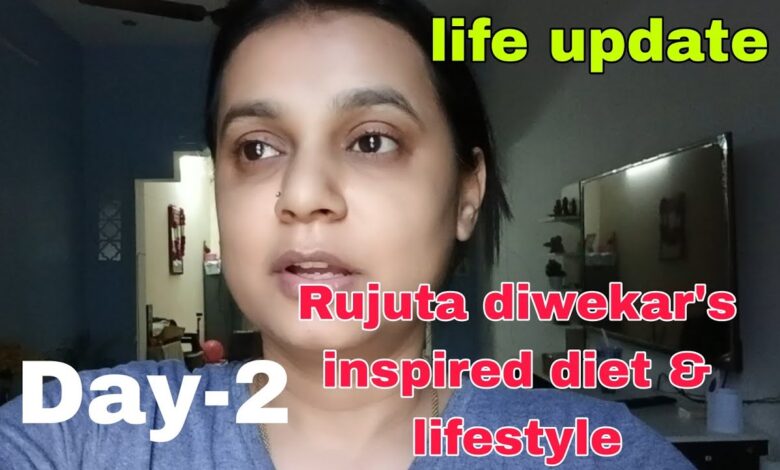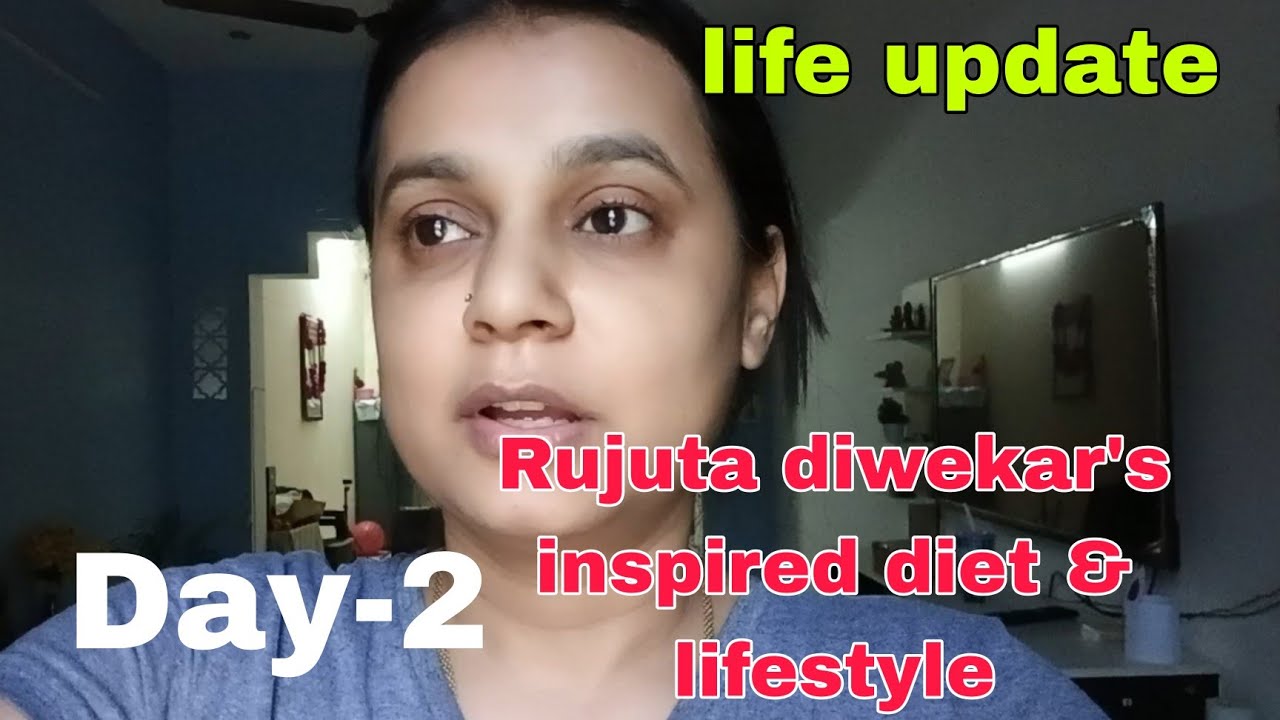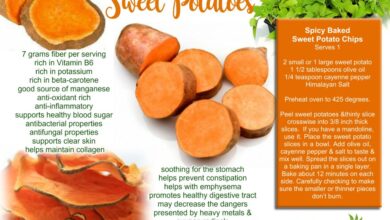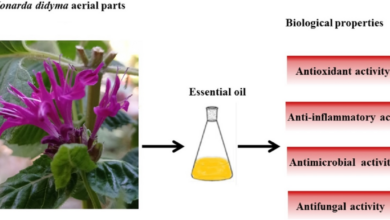
Celebrity Nutritionist Rujuta Diwekar Reveals Quick Fixes to Reduce Inflammation Naturally
Celebrity nutritionist Rujuta Diwekar reveals quick fixes to reduce inflammation naturally, offering a refreshing approach to wellness. Instead of relying solely on medication, Diwekar emphasizes natural methods, focusing on dietary adjustments and lifestyle changes to combat inflammation. This holistic approach tackles the root causes of inflammation, promising lasting relief and improved overall health. We’ll delve into her specific recommendations, exploring quick fixes for immediate relief and long-term strategies for sustained wellness.
This post will break down Diwekar’s philosophy, outlining her core principles and comparing her methods to conventional treatments. We’ll examine her suggested quick fixes, detailing how they work and providing simple recipes. Furthermore, we’ll explore long-term dietary and lifestyle modifications for optimal results, addressing common misconceptions along the way. Get ready to discover how to naturally reduce inflammation and improve your well-being!
Rujuta Diwekar’s Approach to Inflammation Reduction
Rujuta Diwekar, a renowned Indian nutritionist, advocates for a holistic approach to reducing inflammation, focusing on dietary and lifestyle modifications rather than solely relying on medication. Her philosophy centers around aligning with natural rhythms and promoting overall well-being, viewing inflammation not as an isolated issue but as a symptom of a broader imbalance.Rujuta Diwekar’s methods are grounded in the principles of Ayurveda and traditional Indian dietary wisdom, emphasizing the importance of whole, unprocessed foods and mindful eating habits.
She strongly believes in the body’s innate ability to heal and emphasizes empowering individuals to take control of their health through conscious food choices and lifestyle adjustments. This differs significantly from conventional medical approaches, which often involve pharmaceutical interventions to manage inflammation. While medication can be necessary in certain cases, Diwekar’s approach prioritizes prevention and natural remedies as the first line of defense.
Core Principles of Rujuta Diwekar’s Anti-Inflammatory Diet
Diwekar’s anti-inflammatory strategy rests on several key principles. It prioritizes consuming foods that are locally sourced and seasonally appropriate, believing that these foods are better suited to the body’s needs and less likely to trigger inflammation. She also emphasizes the importance of balanced meals that include a variety of nutrients, rather than focusing on single “superfoods.” Furthermore, she advocates for regular meal timings, promoting healthy digestion and metabolic function.
Finally, she emphasizes the importance of mindful eating, encouraging individuals to savor their food and pay attention to their body’s hunger and fullness cues.
Dietary Strategies Recommended by Rujuta Diwekar
Diwekar suggests incorporating several specific dietary strategies to combat inflammation. For example, she recommends consuming a diet rich in fruits, vegetables, and whole grains. These foods are packed with antioxidants and phytonutrients, which have anti-inflammatory properties. She emphasizes the inclusion of healthy fats like ghee (clarified butter) and coconut oil, which are believed to have anti-inflammatory benefits.
Conversely, she discourages the excessive consumption of processed foods, refined sugars, and unhealthy fats, as these are often associated with increased inflammation. Specific examples of her recommended foods include: brown rice over white rice, seasonal fruits and vegetables like spinach and mangoes, and the inclusion of spices like turmeric known for its anti-inflammatory curcumin content. She advocates for a personalized approach, emphasizing that the ideal diet varies depending on individual factors like age, activity level, and geographical location.
Comparison with Conventional Medical Treatments
While conventional medicine often utilizes anti-inflammatory drugs like NSAIDs and corticosteroids to manage inflammation, Diwekar’s approach emphasizes a preventative and holistic strategy. Conventional treatments address the symptoms, while Diwekar’s methods aim to address the underlying causes of inflammation through dietary and lifestyle changes. Her approach is complementary to, not necessarily a replacement for, conventional medical treatments. In cases of severe or chronic inflammation, consulting a doctor and following prescribed medical advice remains crucial.
Celebrity nutritionist Rujuta Diwekar’s tips for reducing inflammation naturally got me thinking about overall health. Maintaining a healthy body is key to preventing age-related issues, which is why I found this article fascinating: can eye test detect dementia risk in older adults. Learning about early detection methods, alongside Rujuta’s advice on diet, feels like a powerful combination for proactive wellness.
Diwekar’s methods are best viewed as a supportive strategy to enhance overall health and well-being, working in conjunction with, rather than in opposition to, conventional medical care.
Quick Fixes for Reducing Inflammation (as per Diwekar)
Rujuta Diwekar, a renowned Indian celebrity nutritionist, emphasizes a holistic approach to health, advocating for simple, readily available solutions to combat inflammation. She stresses the importance of focusing on whole foods and lifestyle adjustments rather than relying solely on supplements or medications. Her quick fixes often center around easily incorporated dietary and lifestyle changes that can provide almost immediate relief from inflammation-related discomfort.
Immediate Inflammation Relief through Hydration
Adequate hydration is crucial for numerous bodily functions, including the efficient removal of inflammatory byproducts. Water helps flush out toxins and supports the body’s natural detoxification processes. Dehydration, on the other hand, can exacerbate inflammation. Diwekar suggests drinking ample water throughout the day, especially before meals, to aid digestion and reduce inflammation. She recommends starting the day with a large glass of warm water with lemon, a practice that she claims aids in cleansing and improves digestive function.
This simple act can significantly impact the body’s ability to combat inflammation.
The Anti-Inflammatory Power of Turmeric
Turmeric, a spice commonly used in Indian cuisine, contains curcumin, a potent anti-inflammatory compound. Diwekar frequently recommends incorporating turmeric into daily meals. Curcumin’s anti-inflammatory effects are attributed to its ability to inhibit the production of inflammatory cytokines, thereby reducing inflammation at a cellular level. A simple way to include turmeric is by adding it to warm milk (golden milk) or incorporating it into curries and vegetable dishes.
The bioavailability of curcumin can be enhanced by combining it with black pepper, which contains piperine, a compound that improves curcumin absorption.
Stress Reduction and Deep Breathing Techniques
Chronic stress significantly contributes to inflammation. Diwekar advocates for stress-reducing techniques like deep breathing exercises and yoga. Stress triggers the release of cortisol, a hormone that can promote inflammation. By practicing relaxation techniques, individuals can lower their cortisol levels, thus mitigating the inflammatory response. Even a few minutes of deep, conscious breathing throughout the day can have a noticeable impact.
Regular yoga practice, which incorporates both physical postures and breathing exercises, offers a holistic approach to stress management and inflammation reduction.
Recipes Incorporating Diwekar’s Quick Fixes
| Recipe Name | Ingredients | Preparation Method | Benefits |
|---|---|---|---|
| Golden Milk | 1 cup milk (dairy or plant-based), 1/2 tsp turmeric powder, pinch of black pepper, 1/4 tsp ginger powder (optional), honey or maple syrup to taste | Heat milk gently. Add turmeric, pepper, and ginger (if using). Simmer for a few minutes. Strain and add sweetener if desired. | Anti-inflammatory, soothing, improves digestion |
| Turmeric Roasted Vegetables | Assorted vegetables (broccoli, carrots, cauliflower, etc.), 1 tbsp olive oil, 1 tsp turmeric powder, salt and pepper to taste | Toss vegetables with olive oil, turmeric, salt, and pepper. Roast in a preheated oven at 400°F (200°C) for 20-25 minutes. | Anti-inflammatory, nutrient-rich, flavorful |
| Lemon Water | 1 large glass of warm water, juice of 1/2 lemon | Squeeze lemon juice into warm water. | Hydrating, aids digestion, supports detoxification |
Dietary Recommendations for Long-Term Inflammation Management: Celebrity Nutritionist Rujuta Diwekar Reveals Quick Fixes To Reduce Inflammation Naturally
Rujuta Diwekar’s approach to long-term inflammation management centers around a holistic lifestyle shift, emphasizing real, unprocessed foods and mindful eating habits. It’s not about restrictive dieting but rather a sustainable approach to nourish your body and reduce inflammation naturally. This involves focusing on nutrient-dense foods, regular exercise, and stress management, all working in synergy for optimal health.
Diwekar’s dietary recommendations prioritize locally sourced, seasonal produce, whole grains, healthy fats, and lean proteins. She emphasizes the importance of understanding your individual body’s needs and adjusting your diet accordingly, rather than following rigid plans. The focus is on eating intuitively and listening to your body’s hunger and fullness cues.
A Sample Weekly Meal Plan Based on Rujuta Diwekar’s Principles
This sample meal plan showcases a balanced intake of macronutrients and micronutrients, incorporating principles of Ayurveda and emphasizing whole, unprocessed foods. Remember to adjust portion sizes based on your individual needs and activity levels. This is a guideline, not a rigid prescription. Consult with a healthcare professional or registered dietitian before making significant dietary changes.
- Monday:
- Breakfast: Oatmeal with berries and nuts
- Lunch: Lentil soup with brown rice
- Dinner: Grilled fish with roasted vegetables (broccoli, carrots, sweet potatoes)
- Tuesday:
- Breakfast: Sprouted moong salad with a squeeze of lemon
- Lunch: Vegetable pulao with raita (yogurt dip)
- Dinner: Chicken stir-fry with brown rice
- Wednesday:
- Breakfast: Idli with sambar and chutney
- Lunch: Mixed vegetable curry with whole wheat roti
- Dinner: Tofu scramble with spinach and whole wheat toast
- Thursday:
- Breakfast: Smoothie with banana, spinach, and almond milk
- Lunch: Leftover tofu scramble
- Dinner: Lentil stew with quinoa
- Friday:
- Breakfast: Yogurt with fruit and granola
- Lunch: Salad with chickpeas, cucumber, and tomatoes
- Dinner: Baked chicken breast with sweet potato fries
- Saturday:
- Breakfast: Pancakes made with whole wheat flour and fruits
- Lunch: Leftover baked chicken and sweet potato fries
- Dinner: Vegetable pizza on whole wheat crust
- Sunday:
- Breakfast: Eggs with avocado toast
- Lunch: Leftover vegetable pizza
- Dinner: Brown rice with roasted vegetables and a lean protein source (like chickpeas or lentils)
How These Dietary Changes Support Overall Health and Well-being
Beyond inflammation reduction, this dietary approach fosters several health benefits. The emphasis on whole grains provides sustained energy and fiber for improved digestion. The inclusion of plenty of fruits and vegetables delivers a rich array of vitamins, minerals, and antioxidants, boosting the immune system and protecting against chronic diseases. Lean protein sources support muscle growth and repair, while healthy fats (like those found in nuts, seeds, and avocados) are crucial for brain function and hormone regulation.
This balanced approach promotes weight management, improves gut health, enhances energy levels, and contributes to a greater sense of overall well-being.
Lifestyle Modifications for Optimal Results

Source: indianexpress.com
While diet plays a crucial role in managing inflammation, lasting results require a holistic approach encompassing lifestyle changes. Ignoring lifestyle factors can significantly hinder efforts to reduce inflammation, even with the most meticulously planned diet. This section explores the vital role of sleep, stress management, and physical activity in achieving optimal anti-inflammatory outcomes.
The Importance of Sleep in Inflammation Reduction
Sufficient sleep is not merely a matter of feeling rested; it’s a fundamental pillar of overall health and a powerful tool in combating inflammation. During sleep, our bodies repair tissues, regulate hormones, and strengthen the immune system – all processes vital in mitigating inflammatory responses. Chronic sleep deprivation disrupts these restorative functions, leading to increased inflammation and a heightened risk of various health problems.
Aiming for 7-9 hours of quality sleep each night is crucial. Consider establishing a regular sleep schedule, creating a relaxing bedtime routine (perhaps a warm bath or reading a book), and ensuring your bedroom is dark, quiet, and cool to optimize your sleep environment. For individuals struggling with insomnia, consulting a healthcare professional is advisable.
Stress Management Techniques for Inflammation Control
Chronic stress significantly elevates levels of cortisol, a hormone linked to increased inflammation. This sustained inflammatory response can contribute to a wide array of health issues. Effective stress management strategies are therefore essential for reducing inflammation. Techniques such as mindfulness meditation, deep breathing exercises, yoga, and spending time in nature have all been shown to lower cortisol levels and promote relaxation.
Regular engagement in these practices can help to break the cycle of stress and inflammation. For instance, even 10 minutes of daily meditation can make a noticeable difference in stress levels and overall well-being.
Rujuta Diwekar’s tips for naturally reducing inflammation are all about whole foods, but maintaining a healthy body also means considering future plans. For example, learning about the fertility journey, like Karishma Mehta’s decision to freeze her eggs as detailed in this article, karishma mehta gets her eggs frozen know risks associated with egg freezing , highlights the importance of proactive health choices.
Ultimately, both Diwekar’s advice and informed reproductive choices contribute to long-term well-being.
Physical Activity and its Anti-Inflammatory Effects
Regular physical activity is a potent anti-inflammatory agent. Exercise boosts the body’s production of anti-inflammatory cytokines, while simultaneously reducing pro-inflammatory markers. The type and intensity of exercise are less critical than consistency. Finding an activity you enjoy and can realistically incorporate into your routine is key to long-term adherence. This could range from brisk walking or cycling to more vigorous activities like swimming or running.
Even short bursts of activity throughout the day, such as taking the stairs instead of the elevator, can accumulate beneficial effects.
Actionable Steps for Improved Lifestyle
To effectively integrate these lifestyle changes into your daily routine, consider these actionable steps:
- Prioritize 7-9 hours of sleep nightly, establishing a consistent sleep schedule and a relaxing bedtime routine.
- Incorporate stress-reducing techniques like meditation, yoga, or deep breathing exercises into your daily routine (even 10-15 minutes can be beneficial).
- Engage in at least 30 minutes of moderate-intensity physical activity most days of the week. Find activities you enjoy and can sustain long-term.
- Limit caffeine and alcohol consumption, as both can exacerbate inflammation.
- Spend time in nature; studies show that exposure to natural environments can reduce stress and inflammation.
- Practice mindful eating, paying attention to your body’s hunger and fullness cues.
Common Misconceptions about Inflammation and Diwekar’s Counterarguments

Source: ytimg.com
Inflammation, a natural bodily response to injury or infection, is often misunderstood. Many believe it’s solely a negative process, leading to widespread misconceptions about its management. Rujuta Diwekar, a renowned Indian nutritionist, challenges these misconceptions with her holistic approach, emphasizing the importance of a balanced lifestyle and diet. This section will explore these common misunderstandings and present Diwekar’s counterarguments, supported by scientific evidence where available.
Inflammation is Always Bad
A prevalent misconception is that all inflammation is harmful. While chronic inflammation is indeed linked to various diseases, acute inflammation is a crucial part of the body’s healing process. Diwekar emphasizes that the body uses inflammation to repair damaged tissues and fight off infections. Suppressing all inflammation, she argues, can hinder this natural healing process. The evidence supporting this lies in the body’s response to injury; the initial swelling and redness are signs of acute inflammation working to remove debris and initiate repair.
Simply put, the body needs some inflammation to function optimally. Completely eliminating inflammation would be detrimental to health.
All Processed Foods Cause Inflammation
Another misconception is that all processed foods are inherently inflammatory. Diwekar refutes this blanket statement, arguing that the inflammatory potential of processed foods depends on their ingredients and preparation methods. She advocates for mindful consumption, distinguishing between minimally processed foods (like lightly salted nuts) and highly processed foods loaded with unhealthy fats, sugars, and additives. While excessive consumption of highly processed foods can indeed contribute to chronic inflammation, Diwekar’s approach focuses on choosing minimally processed options and incorporating traditional methods of food preparation.
For example, a small amount of homemade pickle, using traditional fermentation techniques, may have less of an inflammatory effect than a heavily processed, packaged snack.
Celebrity nutritionist Rujuta Diwekar’s tips for naturally reducing inflammation are all about whole foods and mindful eating, a holistic approach that contrasts sharply with some medical advancements. For example, the recent news that the fda approves clinical trials for pig kidney transplants in humans highlights how we sometimes seek dramatic solutions for complex health issues. However, Diwekar emphasizes that often, simple dietary changes can make a huge difference in managing inflammation and overall well-being.
Dietary Restrictions are the Only Solution
Many believe that strict dietary restrictions are the only way to manage inflammation. Diwekar challenges this by emphasizing the importance of a balanced and varied diet, rather than eliminating entire food groups. She promotes a holistic approach that includes a balanced intake of macronutrients, micronutrients, and traditional cooking methods, rather than focusing solely on eliminating specific foods. For example, while some individuals might react negatively to gluten, others might find it perfectly tolerable.
A balanced approach allows for individual needs and preferences. This is backed by research showing that a diverse microbiome, fostered by a varied diet, plays a crucial role in immune regulation and inflammation management.
Supplements are a Necessary Cure
The belief that inflammation requires expensive supplements for management is another misconception. Diwekar advocates for a natural approach, emphasizing the power of whole foods and lifestyle changes. While certain supplements might play a supporting role, she prioritizes a balanced diet rich in anti-inflammatory foods and regular physical activity. The focus should be on building a healthy foundation through lifestyle changes, rather than relying solely on external supplements.
The evidence supporting this lies in the abundance of research demonstrating the effectiveness of dietary interventions in managing inflammatory conditions.
| Misconception | Diwekar’s Counterargument |
|---|---|
| All inflammation is bad. | Acute inflammation is essential for healing; chronic inflammation is the concern. |
| All processed foods cause inflammation. | The inflammatory potential depends on ingredients and processing methods. |
| Dietary restrictions are the only solution. | A balanced and varied diet is crucial, avoiding the elimination of entire food groups. |
| Supplements are a necessary cure. | A holistic approach prioritizing whole foods and lifestyle changes is key. |
Illustrative Examples of Diwekar’s Methods in Action
Rujuta Diwekar’s approach to reducing inflammation isn’t about restrictive diets or fad cleanses; it’s about making sustainable lifestyle changes that support the body’s natural healing processes. Seeing these principles in action provides a powerful illustration of their effectiveness. Let’s look at a hypothetical case study to understand how her methods can make a real difference.
A Case Study: Reversing Chronic Inflammation Through Dietary and Lifestyle Changes, Celebrity nutritionist rujuta diwekar reveals quick fixes to reduce inflammation naturally
This example follows a 45-year-old woman, let’s call her Anya, who presented with persistent joint pain, fatigue, and digestive issues. Her blood tests indicated elevated markers of inflammation, including C-reactive protein (CRP). Anya had tried various diets and supplements without lasting success. She felt overwhelmed and frustrated by her condition. Anya’s initial state was characterized by high levels of inflammation, low energy, and a diet heavy in processed foods and refined carbohydrates.
Her weight was slightly above the healthy range.Anya’s journey began by focusing on whole, unprocessed foods, prioritizing seasonal fruits and vegetables, and incorporating traditional Indian spices known for their anti-inflammatory properties like turmeric and ginger. She reduced her intake of refined carbohydrates, processed foods, and sugary drinks. She also incorporated regular exercise, focusing on low-impact activities like yoga and walking, which Diwekar often recommends.
Sleep became a priority, with Anya aiming for seven to eight hours of quality sleep each night. She also made conscious efforts to manage stress through mindful practices.The visual representation of Anya’s transformation would show a bar graph. The “before” bar would be tall for CRP levels and relatively short for energy levels. The “after” bar would show a significant decrease in CRP, a noticeable increase in energy levels, and a slight decrease in weight, reflecting a healthier body composition.
Anya’s joint pain gradually reduced, her energy levels significantly improved, and her digestive issues lessened. Her blood tests after six months showed a dramatic reduction in her CRP levels, indicating a significant decrease in inflammation. Her overall well-being and quality of life improved substantially.
Last Word
Rujuta Diwekar’s approach to reducing inflammation emphasizes a holistic, natural path to better health. By combining simple dietary changes, mindful lifestyle adjustments, and a focus on addressing the root causes of inflammation, her methods offer a powerful and sustainable way to manage this widespread health concern. Remember, consistent effort is key; small changes, implemented consistently, can lead to significant improvements in your overall health and well-being.
Start incorporating these strategies today and experience the transformative power of natural inflammation reduction!
FAQs
What are some common signs of inflammation?
Common signs include joint pain, swelling, fatigue, digestive issues, and skin problems. However, inflammation can also be present without noticeable symptoms.
Is Rujuta Diwekar’s approach suitable for everyone?
While generally safe, it’s crucial to consult your doctor before making significant dietary or lifestyle changes, especially if you have underlying health conditions.
How long does it take to see results using Diwekar’s methods?
Results vary depending on individual factors, but many people report noticeable improvements within weeks of consistent implementation.
Are there any specific foods Diwekar recommends avoiding?
Diwekar often advocates for reducing processed foods, excessive sugar, and refined carbohydrates, promoting whole, unprocessed foods instead.





